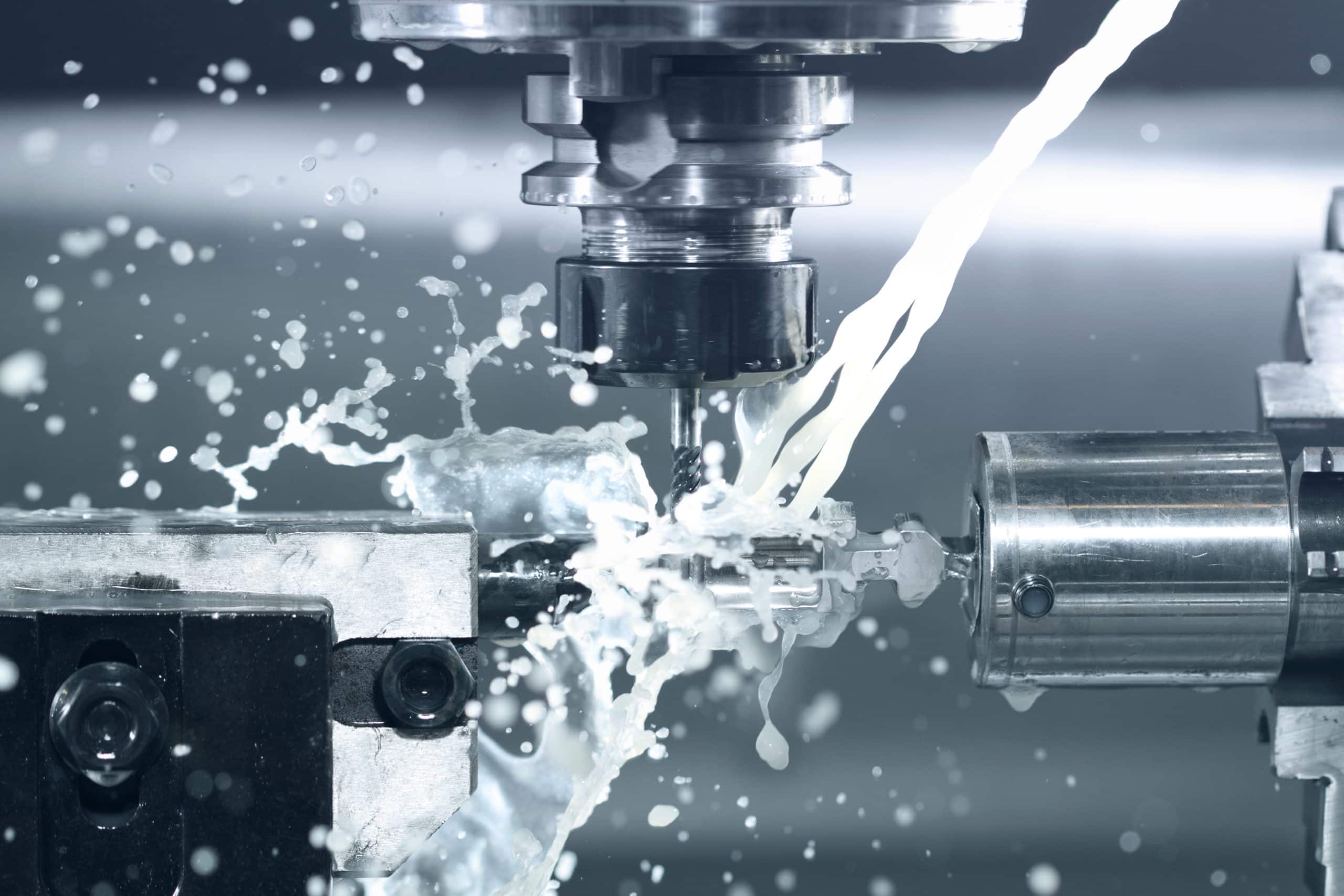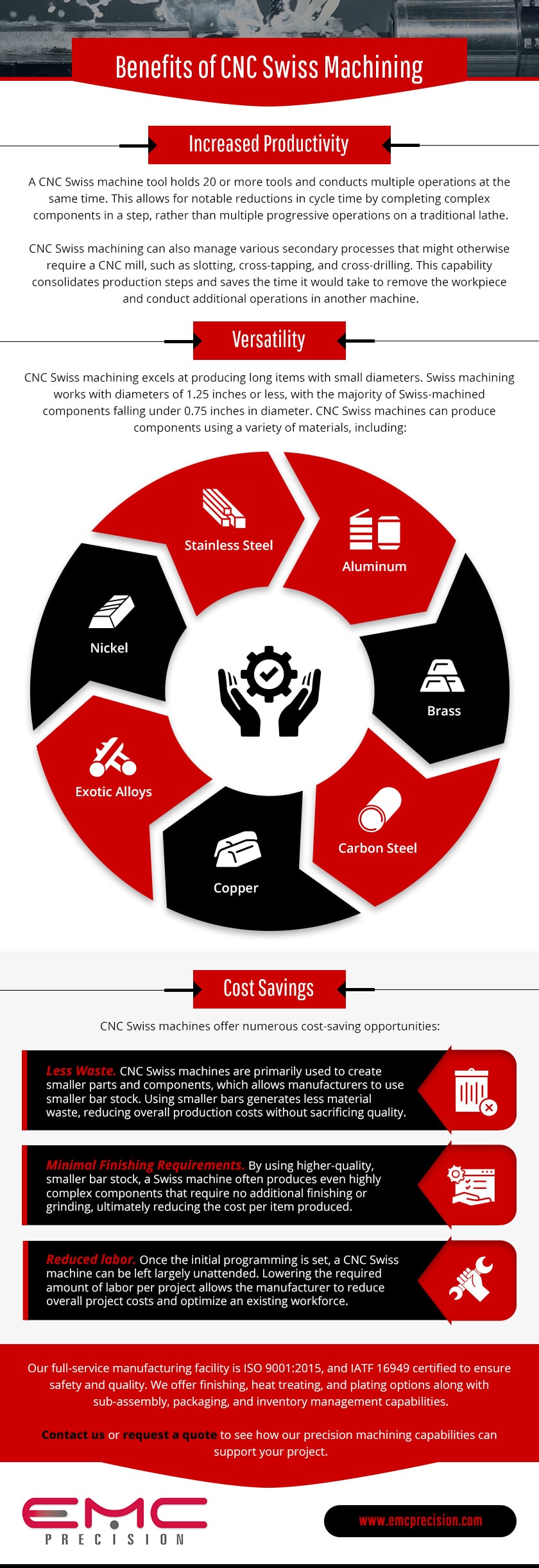CNC Swiss Machining Capabilities
Computer numerical control (CNC) Swiss machining brings additional precision and efficiency to production operations. In this process, multiple sets of tooling can conduct operations simultaneously or in rapid succession as the workpiece spins on a rotating lathe. A moveable headstock sets a Swiss machine apart from a conventional CNC turning machine or lathe, which feature fixed headstocks.
Specialized design applies the force of the cutting tool as the workpiece comes out of the guide bushing, and only the part of the component that is being worked on is exposed. This superior stability translates into fewer deflections and greater precision, making CNC Swiss machining ideal for complex projects with tight tolerances — especially for small or thin components.
CNC Swiss Machining
With our lineup of Swiss, multi-axis, multi-spindle, horizontal and vertical machining centers, we operate at a very high level of productivity. These machines enable us to carry out multiple operations simultaneously and create complex parts from a single set up. Along with a wide-ranging selection of metals such as stainless steel, alloy steel, aluminum, and high-performance alloys, we work with a range of general-purpose and engineering-grade plastics. With our quality oriented and computer-driven manufacturing systems, we repeatedly obtain tolerances as close as ±0.0005″ on orders that range in size from prototype to the tens of millions.
- Multiple axis Swiss turn and mill
- Standard tooling incorporating complex geometries in one process
- Short lead times
- No extensive tooling, greater opportunity for teamwork at the design stage
Benefits of CNC Swiss Machining
CNC Swiss machining offers numerous benefits for specific project types. Some of these include:
Increased Productivity
A CNC Swiss machine tool holds 20 or more tools and conducts multiple operations at the same time. This allows for notable reductions in cycle time by completing complex components in a step, rather than multiple progressive operations on a traditional lathe. CNC Swiss machining can also manage various secondary processes that might otherwise require a CNC mill, such as slotting, cross-tapping, and cross-drilling. This capability consolidates production steps and saves the time it would take to remove the workpiece and conduct additional operations in another machine.
Versatility
CNC Swiss machining excels at producing long items with small diameters. Swiss machining works with diameters of 1.25 inches or less, with the majority of Swiss-machined components falling under 0.75 inches in diameter. CNC Swiss machines can produce components using a variety of materials, including:
- Aluminum
- Brass
- Carbon steel
- Copper
- Exotic alloys
- Nickel
- Stainless steel
Cost Savings
CNC Swiss machines offer numerous cost-saving opportunities:
- Less waste. CNC Swiss machines are primarily used to create smaller parts and components, which allows manufacturers to use smaller bar stock. Using smaller bars generates less material waste, reducing overall production costs without sacrificing quality.
- Minimal finishing requirements. By using higher-quality, smaller bar stock, a Swiss machine often produces even highly complex components that require no additional finishing or grinding, ultimately reducing the cost per item produced.
- Reduced labor. Once the initial programming is set, a CNC Swiss machine can be left largely unattended. Lowering the required amount of labor per project allows the manufacturer to reduce overall project costs and optimize an existing workforce.
Industry Applications for CNC Swiss Machining
Swiss-style machines were originally developed to produce small screws and other thin components required for high-quality Swiss watches. The process has evolved, making it popular for the production of precise components in many sizes and degrees of complexity. Today, CNC Swiss machining is commonly used to create parts and components used in:
- Agriculture
- Aerospace
- Automotive
- Construction
- Consumer electronics
- Government and military
- Hydraulics
- Lawn and garden
- Musical instruments
- Medical devices and equipment
- Power equipment and power distribution
Types of Swiss Screw Machines and How They Work
There are two primary types of Swiss-style turning machines: CNC, as discussed above, and automatic:
- A collet holds the workpiece in place while a disc cam rotates the tools toward it. The disc cams can account for longitudinal discrepancies in the workpiece while moving the tools in a radial motion. With close spindle collets, deflected debris is usually not a problem.
- A CNC machine controls all operations and tool interactions using precision CNC equipment. This allows for more tools on the machine and often allows multiple operations to be performed at the same time. On average, a CNC Swiss machine offers tolerance accuracy within 0.0002-0.0005 inches while rotating a part at up to 10,000 RPM. Even though an automatic Swiss screw machine can perform multiple functions with precision, it can’t compete with the speed of a CNC machine.
While CNC machines may work more quickly and with higher levels of precision, automatic Swiss turning machines still offer good precision for small part production. Both styles are still commonly used in machine shops today, but CNC machines have overtaken automatic machines in popularity for their enhanced speed and higher-volume capabilities.
The initial set-up and preparation takes time and tooling can be prohibitively expensive on smaller production runs. As such, Swiss turning machines are often preferred for high-volume production where economies of scale can offset the upfront tooling and setup costs. CNC Swiss turning machines can handle part volumes into the tens of millions, which significantly reduces the overall cost per unit.
CNC Machining Centers – HMC/VMC
- Consistency, high accuracy—tolerances to .0005—for parts that cannot be turned
- Efficient, consistent secondary operations on screw machine parts
- Simultaneous manufacturing of multiple parts
- High productivity, increased savings
CNC Milling/Turning Centers
- Designed for need-it-now rapid response
- Complex parts produced with short lead times
- Production and prototype lot sizes
We operate within a ISO 9001, and IATF 16949 certified quality framework, and our facility houses a metrology lab outfitted with the finest instruments and tools for test, measurement, and inspection. Our engineers are available to carry out design-for-manufacturability assessments to build cost-savings into the manufacturing process, and we offer numerous finishing, heat treating, and plating options. We serve customers in a diversity of markets, including general industrial, aerospace, automotive, heavy vehicle, appliance, marine, medical, hydraulic/fluid power, and many others. To learn more about our company, our precision CNC machining capabilities, or to request a quote, contact us directly.
About EMC Precision
At EMC Precision, our equipment portfolio includes an advanced lineup of Swiss, multi-axis, multi-spindle, and horizontal and vertical machining centers for use with a variety of metals, high-performance alloys, and engineering-grade plastics. We can handle production volumes ranging from prototypes to millions of units.
Our full-service manufacturing facility is ISO 9001:2015, and IATF 16949 certified to ensure safety and quality. We offer finishing, heat treating, and plating options along with sub-assembly, packaging, and inventory management capabilities.
Contact us or request a quote to see how our precision machining capabilities can support your project.











